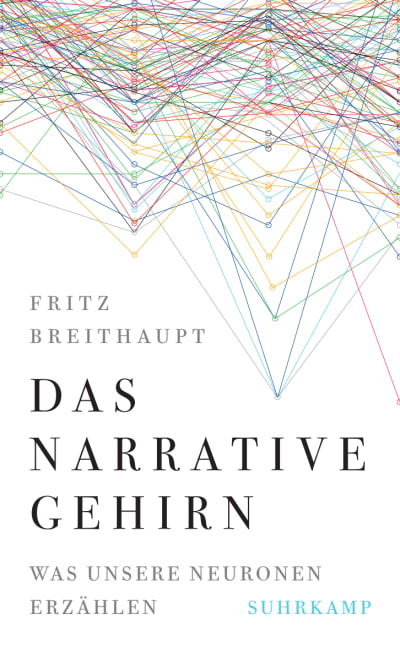English world rights (Yale UP), Spanish world rights (Sexto Piso), Italy (Lit/Castelvecchi), Korea (Eco-Livres), Hungary (Typotex), Bulgaria (Funtasy)
Austria's Non-Fiction Book of the Year 2023 (category: Medicine/Biology)
A redefinition of humans as narrative beings
#1 Best Non-Fiction of the Month
#5 in BuchMarkt's Top Five of German-language business books (February 2023)
Tapping into the essence of thinking in stories, Breithaupt draws on the latest scientific research including neuroscience and experiments where thousands of subjects play the telephone game, as well as on literary analysis of novels, Grimm’s fairy tales, and everyday office gossip. The reward of narrative thinking, it turns out, is emotional, and we live the way we live because we follow the specific reward patterns of narratives. Yet at the same time, things can always turn out differently in narratives, and it is precisely this fact that allows us to try out different versions of our own lives.
»Applying the concept and the analysis of narration not to previously spoken or written texts, but to a practice of consciousness that we all perform daily and that is nevertheless specific, is the first punch line of Fritz Breithaupt’s book on ›the narrative brain.‹ From this premise, he develops nothing less than an approach to a completely new kind of psychology. The second punch line is a result of the competence with which he brings into play the most important insights that the humanities and natural sciences have previously developed in regard to narratives, which have always been manifest, from their structure to their aesthetics to their political-social functions. The fact that Breithaupt thus invites his readers to enjoy a productive reflection on their own existence, instead of guiding them in an overly pedagogical or authoritarian manner, is what makes this essay so charming.« Hans Ulrich Gumbrecht, Albert Guérard Professor in Literature, emeritus, Stanford University, and author of Production of Presence
»Everyone is talking about narratives. Finally there is a book to explain what’s really behind this.« Wolfram Eilenberger, author of Time of the Magicians
»Fritz Breithaupt expands our understanding of the co-creating reader, who entertains multiple possible directions, possibilities, and outcomes of a narrative while reading. His work illuminates both the narrative patterns in ordinary thought and the special form of multiversional imagining that occurs when readers engage with narrative emotionally. Breithaupt’s ingenious experiments support his rich theorizing about readers’ emotional and imaginative engagement with narrative. This interdisciplinary work will be of interest to literary theorists, psychologists of narrative impact, philosophers, cognitivists, and students of affect and the emotions.« Suzanne Keen, Dean of Faculty and Professor of Literature and Creative Writing, Hamilton College, and author of Empathy and the Novel
»[Breithaupt's] intelligent defence of a culture of storytelling against the dictate of numbers, which at the same time creates a refreshing plea for gossip, for TV series and literature, for making things up and passing them on, defines Homo sapiens as Homo narrans.« Marie-Luise Goldmann, Welt am Sonntag
»Fritz Breithaupt outlines a large-scale theory of the human penchant for stories [...] and reaches, one hopes, a broad audience.« Albrecht Koschorke, Frankfurter Allgemeine Zeitung
»A modern politician needs a good story, says Fritz Breithaupt. He shows how narratives can change the world for the better or manipulate people.« Der Spiegel
»Fritz Breithaupt examines the role stories play for the human brain.« Der Tagesspiegel
»The Narrative Brain is a stimulating introduction to the theory of narration.« Deutschlandfunk
»People today remember many of the greatest crises of humanity like a fairy tale, a story. Facts play only a subordinate role in the processing of human memories, according to cognitive researcher Fritz Breithaupt.« SWR
Persons
Fritz Breithaupt
OTHER PUBLICATIONS

Once Is Never Enough
Do you remember your first kiss? Our first experiences may have been terribly embarrassing, maybe clouded in our memory, yet they mark a beginning. Everything afterward becomes repetition. To be sure, repetitions carry their own power—they may be more enjoyable because we can compare them to what came before. This book explores the nature of human experiences. While we often think of...

The Dark Sides of Empathy
Empathy is considered the basis of moral action. But if we examine this more carefully, the ability to »empathize with other people« proves itself to be a prerequisite for deliberate...
English world rights (Cornell UP), Korea (SOSO)
Previously published in the respective language / territory; rights available again: Hungary (Typotex)

Culture of the Excuse

Cultures of Empathy
Spanish world rights (Katz)
